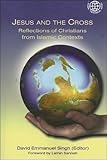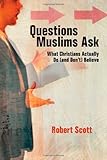 STUDENT: What is Islam?
STUDENT: What is Islam?
ANTHROPOLOGIST: Lots of things, of course.
STU: Yeah, but I mean, is Islam its holy books or what Muslims do?
ANT: Neither, I suppose.
STU: Well, it should be one or the other for sure!
ANT: Why should it be so?
STU: I think that the Qur’an and Hadiths, and the other texts, tell Muslims how to be Muslims and this guides their actions.
ANT: OK, we can try an experiment. Get that copy of the Qur’an on my desk. So, tell me what this is.
STU: A book; a holy book, at least for Muslims.
ANT: What makes it holy?
STU: The fact that Muslims consider it so.
ANT: OK, but if you were a Muslim why would you have insisted that this particular book is the holiest?
STU: That’s simple Doc! Because, I would believe the book to be God’s words.
ANT: You see, Islam is not just what is written in its books.
STU: Why not? I don’t follow you.
ANT: Well, it’s very simple. You just said that this book, the Qur’an, is holy because at least one Muslim believes that God revealed it. Now you can agree with me that Muslims, each of them, have to perform cognitive operations to form a cognitive map of what for them is Islam. There is no Islam without mind.
STU: Certainly, you need Muslims to have Islam. Yet I still think that what is written in the sources of Islam shapes how Muslims are. Though there are some cultural differences, I am not sure about your point. I think that something called Islam actually exists.
ANT: OK, we will proceed point by point. Not only do we have different cultures among Muslims but also different interpretations. Which is the most basic element that you need to form interpretations?
STU: First, you need to know at least the language in which the text has been transmitted or trust a translation; but there are also other elements, like personal views and social conditions that surely influence one’s interpretation.
ANT: You are discussing a second order of elements. I asked about the basic element without which we cannot have interpretations, or any other mental process, since interpretations are complex mental processes.
STU: Well . . . the most basic is that you should be able to think. To have mental processes, like thoughts, we need a mind.
ANT: Yes, because for the ‘thing’ we call Islam to exist, we need a mind that can conceive of it, making it part of a mental process.
STU: Why refer to Islam as ‘the thing’ now?
ANT: You have just agreed that Islam exists because of the mental processes allowing some people to make sense of certain texts and practices. Are mental processes ‘real’ things?
STU: Well, I would say that they are exactly that, processes. We make sense of what is around us through mental processes.
ANT: Exactly, we, as human beings, through mental processes form what we can call maps.
STU: I can see that. So you are saying that Islam is just a map.
ANT: Well, more than one, for sure. It’s like one of those maps formed by many other different small maps, which, when put together, represent a vast territory.
STU: And, as you have reminded us many times, the map is not the territory.
ANT: But in this case, we can only know the map, since the territory consists of an endless ensemble of mental processes.
STU: At this point, I do not see the difference between a Muslim and non-Muslim forming mental processes about Islam. What makes them different?
ANT: Nothing, indeed, if we speak of the cognitive processes involved. You know, I have the impression that the most important thing that has been forgotten while studying Muslims is the otherwise obvious fact that they are human beings like me and you.
STU: But, I mean, doesn’t the fact that they believe in Islam make their mind different? Sometimes, in some articles, I come across the expression ‘Muslim mind’.
ANT: Some scholars, and unfortunately some anthropologists among them, have even suggested that a Muslim mind can exist. But how can a mind, which means cognitive processes allowed through neurological activities, be Muslim? Think if we extend this reasoning to other adjectives: Christian minds, Conservative minds, Jewish minds, Scientology minds, Jedi minds and Flying Spaghetti Monster minds.
STU: So, what makes a person a Muslim? I thought that the fact that a person believes in the Qur’an and the sunna and in the shahda, the profession of faith, makes a person a Muslim.
ANT: You are suggesting that it is the person’s act of believing that makes him a Muslim. Let me see . . . do you believe that Juan Carlos I is the king of Spain?
STU: Yes, Doc.
ANT: Are you Spanish?
STU: Of course not. You know I’m Scottish!
ANT: Why are you Scottish and not Spanish, though you believe that Juan Carlos I is the king of Spain?
STU: First, I was not born in Spain, I do not have Spanish parents and, by the way, I do not feel Spanish at all. I am not emotionally attached to the idea of being Spanish. Like during the World Cup, if Scotland is not playing, I can support another team, but when Scotland is playing, I am excited and feel something . . . a particular attachment that tells me that I’m Scottish.
ANT: Indeed, what matters here is that you feel to be Scottish.
STU: Are you suggesting that Muslims are Muslims because they consider themselves Muslim?
ANT: Does it sound so strange?
STU: Well, if you are right it means that the most important aspect is neither what the Islamic texts read, nor what Muslims believe, nor how they act, but rather whether or not they believe themselves to be Muslims, and here emotions play a very important role, as in my case of feeling to be Scottish.
ANT: Yes, this is correct. We need to restart our research, as anthropologists, from that ‘feeling to be’, in this case, Muslim.
I’m not sure every anthropologist would agree with this. The point is, Islam is diverse and regionally based. As Christians, we should be more interested in engaging Muslims than we should in engaging ‘Islam.’
Here are a couple more resources I’m reading right now, and I’ll let you know what I think about them:





